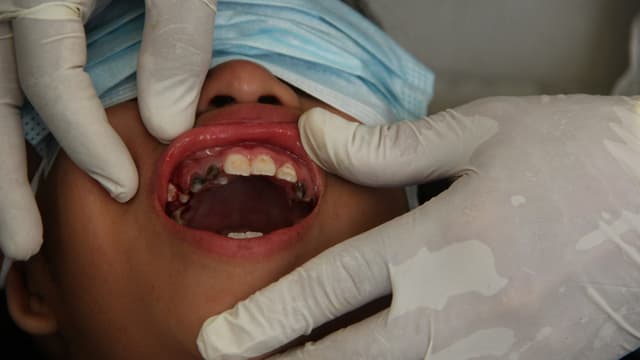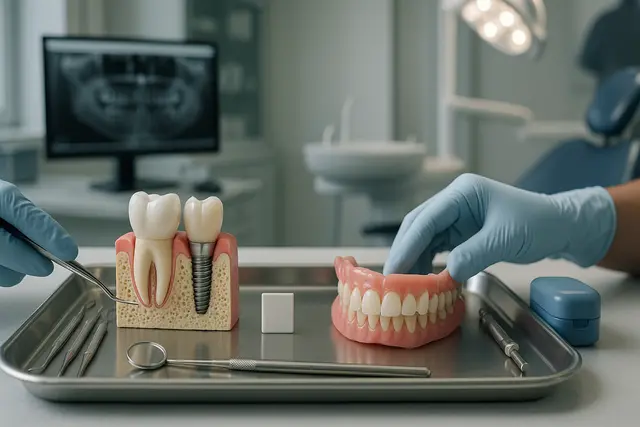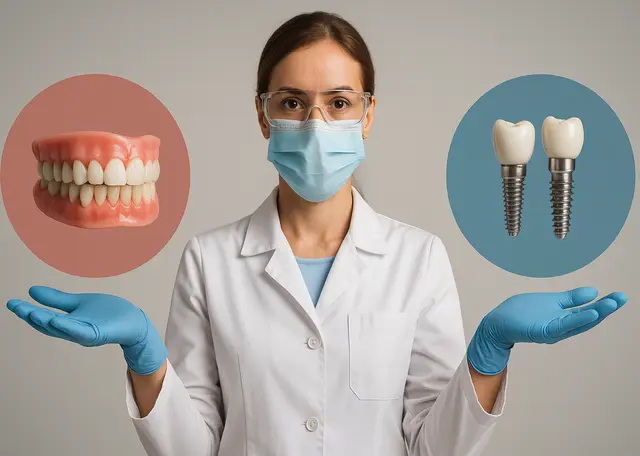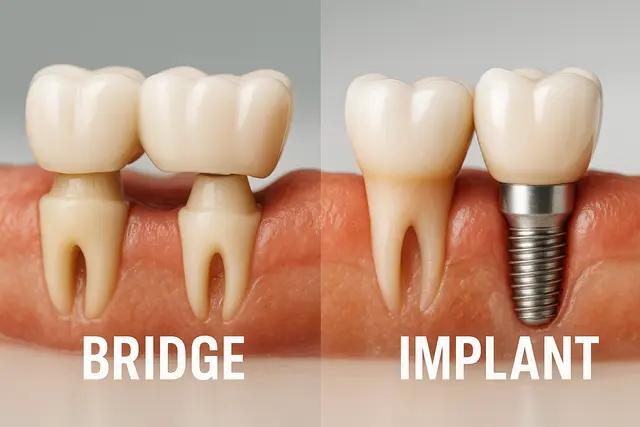Prosthodontics
3 min read
Mar 28, 2025
Can Dental Implants Get Cavities? Maintenance and Prevention
So, you’ve got a dental implant, or maybe you’re considering getting one, and now you’re wondering if your shiny new tooth is safe from cavities. It’s a fair question. After all, no one wants to swap one dental issue for another. Here's the good news: dental implants can’t get cavities. Seriously. Because they’re not made of enamel, like your natural teeth, they’re immune to the kind of decay that causes cavities.

Dental Implants vs. Natural Teeth
A dental implant is typically made of materials like titanium, with a ceramic or composite artificial tooth that sits on top. This implant replaces the tooth root and gives your replacement tooth a firm, long-lasting base. Since it’s not real tooth enamel, it cannot get cavities.
But, and here’s that “but” again, the gums and bone around the implant are still very real, and they still need protection. Just like natural teeth, implants rely on healthy gums to stay in place and function properly. So even though the implant itself won’t develop cavities, you still need to take excellent care of it.
Can Dental Implants Get Cavities?
We get this question a lot: Can dental implants get cavities? Technically, no. Dental implants can’t get cavities because there’s no enamel to decay. But that doesn’t mean you’re in the clear. Bacteria in the mouth can still cause gum disease and peri-implantitis, an infection that happens around dental implants. And trust us, you do not want to deal with that. It's one of the top reasons for implant failure.
So, while dental implants may be cavity-proof, the surrounding area is not. Think of your implant like a high-end car: the body won’t rust, but you still need to change the oil.
Care for Dental Implants
Now, how do you care for dental implants so they last a lifetime? You’ll need to keep up with good oral hygiene practices. That means brushing your teeth twice a day with a soft-bristled toothbrush and using dental floss or a water flosser to clean around the implant site. Yes, even if the implant can’t get cavities, plaque and oral bacteria can still cause issues with your gum health.
Also, schedule a consultation with your dentist for regular dental cleanings and check-ups. That way, we can catch any early signs of implant complications before they become a bigger deal.
Oral Hygiene Isn’t Optional
Look, we get it. Once your teeth are replaced, it’s tempting to think you’re done with the whole brushing and flossing gig. But that’s a dangerous assumption. Poor hygiene can lead to peri-implantitis, which acts a lot like tooth decay, just without the actual cavity. Left untreated, it can lead to tooth loss, even of the implant.
Maintaining good oral hygiene is what separates a successful, long-lasting dental implant from one that might cause you grief down the road.
Why Implants Still Need Your Attention
Here’s a fun fact: implants may look and function like natural teeth, but they don’t come with superpowers. Sure, they’re tough. They’re made of titanium. But they’re not indestructible. They can still be affected by plaque buildup, gum disease, and poor oral care.
Cavities form because of acid produced by bacteria. While implants don’t have tooth enamel, the same acid can inflame and destroy gum tissue. And that’s the kind of oral issue no one wants to deal with.
Prevention Is the Best Policy
Here’s what you can do:
Brush twice a day with fluoride toothpaste (yes, still).
Floss or use a water flosser daily, don’t let gunk collect around the implant.
Stick to regular dental checkups and oral cleanings.
Avoid smoking. It’s a fast track to implant failure.
Stay away from sugary snacks that fuel plaque and bacteria.
By keeping up with exceptional dental care, you’re not just caring for the implant, you’re protecting your oral health as a whole.
Let’s Wrap It Up (No Tooth Fairy Required)
Although dental implants can’t get cavities, they’re not maintenance-free. You still need to practice good oral hygiene, treat them like your own natural teeth, and visit your dentist for routine care. Getting dental implants is a fantastic tooth replacement option, but like anything worthwhile, they need your attention to stay at their best.
If you’ve got more questions about dental implants, or want to make sure you’re following the right implant care steps, just give us a call. We’re always here to make oral health less of a headache, and maybe even a little fun.
Can Dental Implants Get Cavities?
No, dental implants can’t get cavities because they’re made of materials like titanium and ceramic that don’t decay. However, the gums and bone around the implant are still vulnerable to infection, particularly peri-implantitis, which can lead to implant failure if not properly managed.
Do You Still Need to Brush and Floss Around Dental Implants?
Absolutely. Even though implants can’t decay, plaque and bacteria can still build up around them. Brushing twice a day and flossing or using a water flosser helps protect your gums and prevent infection around the implant area.
What Is Peri-Implantitis and Why Should I Care?
Peri-implantitis is a gum infection that occurs around a dental implant. It behaves similarly to gum disease and can lead to bone loss and implant failure. It's preventable with good oral hygiene and regular dental visits, making daily care crucial even if the implant itself can’t get cavities.
How Do I Keep My Dental Implants Healthy Long-Term?
Maintain consistent oral hygiene by brushing with fluoride toothpaste, flossing daily, avoiding tobacco, limiting sugary snacks, and seeing your dentist for routine checkups. These steps help ensure your dental implant remains stable and your gums stay healthy for years to come.
Read Next
Related Posts

Prosthodontics
Implant vs. Dentures Pros and Cons: A Deep Dive into Modern Solutions
Missing teeth can impact more than just your smile, they can affect how you eat, speak, and feel about yourself. Fortunately, modern dentistry offers two leading solutions to bring back both function and confidence: dentures and dental implants. Understanding the pros and cons of each can help you make the choice that fits your needs, lifestyle, and budget.
7 min read
Oct 17, 2025

Prosthodontics
Full Mouth Implants vs. Dentures: Which Is Better for You?
When it comes to replacing missing teeth, the choice between full mouth dental implants and dentures can be overwhelming. Each option has its own set of benefits, limitations, and long-term considerations, making it essential to understand what works best for your needs, health, and lifestyle.
5 min read
Oct 17, 2025

Prosthodontics
Tooth-Supported Bridge vs. Implant Comparison: Benefits, Drawbacks, and Insights
Deciding between a dental bridge and a dental implant can feel overwhelming, especially when both options promise to restore your smile and improve oral function. Each solution comes with its own set of benefits, considerations, and ideal use cases, making it essential to understand how they compare before choosing what’s right for you.
6 min read
Oct 17, 2025
Don’t have time to research every dentist around you?
See why 30k+ patients trusted us